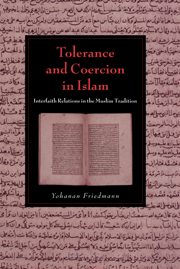Book contents
- Frontmatter
- Contents
- Preface
- Introduction
- 1 Religious diversity and hierarchy of religions
- 2 Classification of unbelievers
- 3 Is there no compulsion in religion?
- 4 Apostasy
- 5 Interfaith marriages
- 6 Concluding observations
- Selected Bibliography
- General Index
- Index of Qurʾānic verses
- Index of prophetic traditions
5 - Interfaith marriages
Published online by Cambridge University Press: 10 August 2009
- Frontmatter
- Contents
- Preface
- Introduction
- 1 Religious diversity and hierarchy of religions
- 2 Classification of unbelievers
- 3 Is there no compulsion in religion?
- 4 Apostasy
- 5 Interfaith marriages
- 6 Concluding observations
- Selected Bibliography
- General Index
- Index of Qurʾānic verses
- Index of prophetic traditions
Summary
Do not marry idolatresses until they believe; a believing slave-girl is better than an idolatress, though you may admire her. And do not marry idolaters, until they believe. A believing slave is better than an idolater, though you may admire him …
(Qurʾān 2:221)O believers, when believing women come to you as emigrants, test them … Then, if you know them to be believers, return them not to the unbelievers. They are not permitted to the unbelievers, nor are the unbelievers permitted to them … Do not hold fast to the ties of unbelieving women …
(Qurʾān 60:10)Today the good things are permitted to you, and the food of those who were given the Book is permitted to you, and permitted to them is your food. Likewise believing women in wedlock, and in wedlock women of them who were given the Book before you if you give them their wages, in wedlock and not in license, or as taking lovers.
(Qurʾān 5:5)In its attitude to the question of interfaith marriages, Islam is substantially different from Judaism and Christianity. In the religious laws of these two traditions, the attitude to all religiously mixed marriages is negative. Both the Old Testament and the Talmud contain explicit injunctions forbidding matrimony between Jews and non-Jews.
- Type
- Chapter
- Information
- Tolerance and Coercion in IslamInterfaith Relations in the Muslim Tradition, pp. 160 - 193Publisher: Cambridge University PressPrint publication year: 2003
- 1
- Cited by

